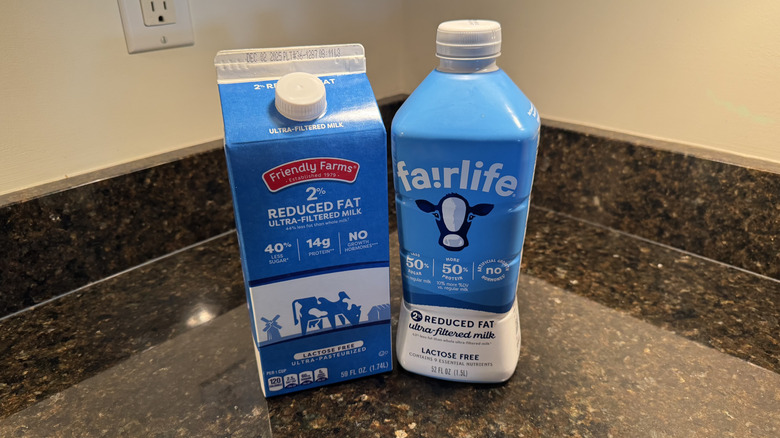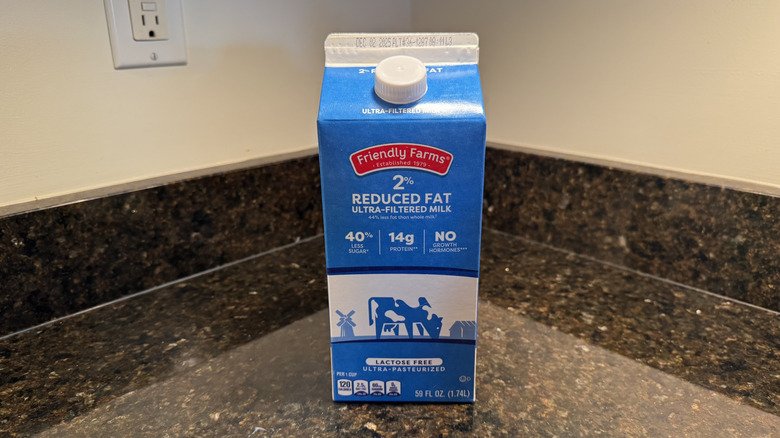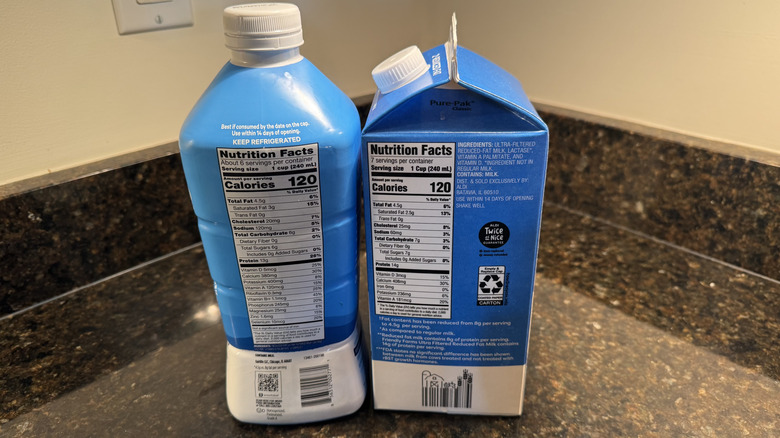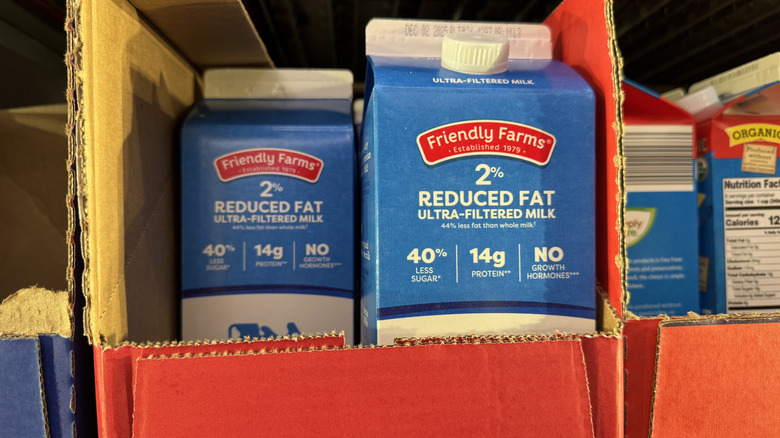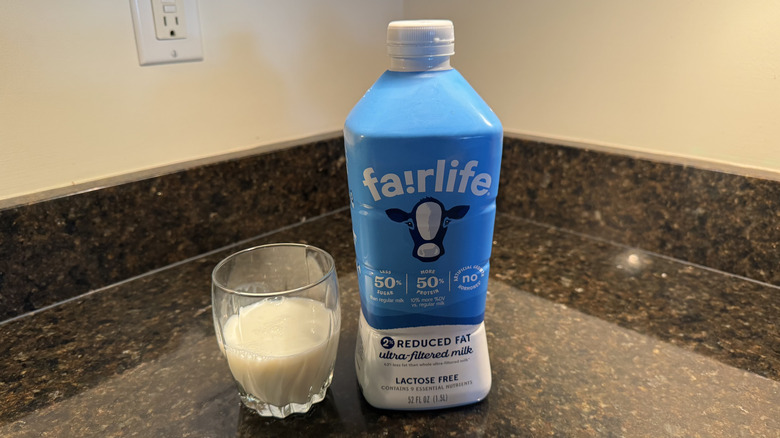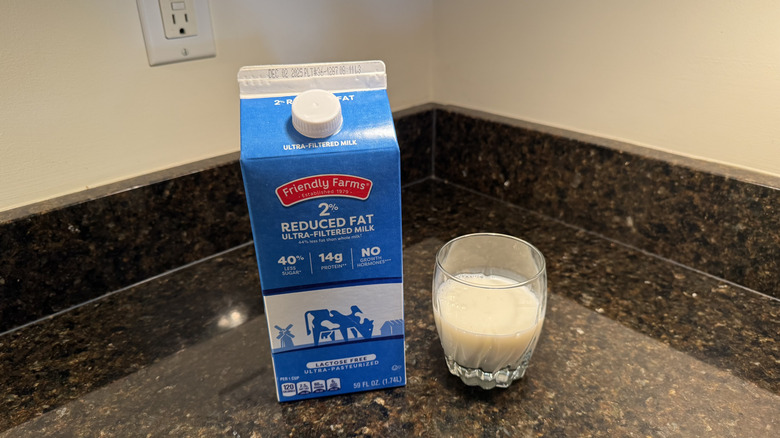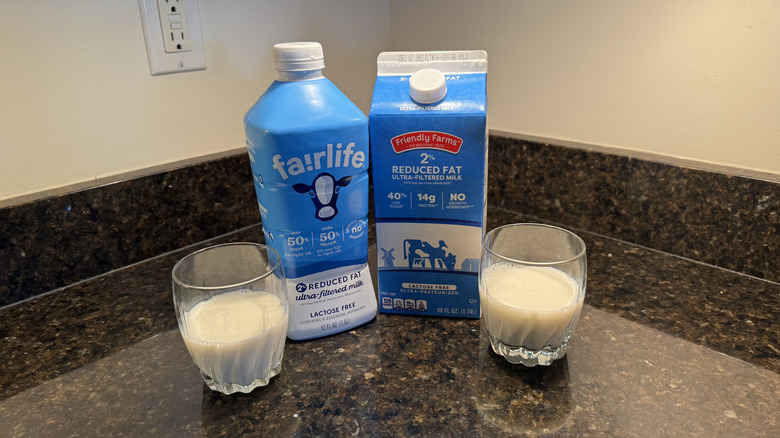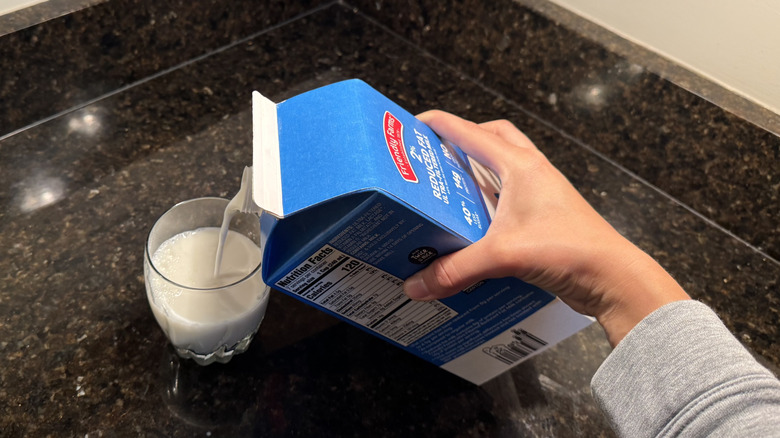Aldi's Friendly Farms Ultra-Filtered Milk Is The Fairlife Dupe We Didn't Know We Needed
Nowadays, it can seem like everything in the grocery store (and beyond) is protein-ified. Starbucks is releasing its protein-spiked cold foam, and you can find protein-added versions of everything from tortillas to Greek yogurts lining the aisles of wherever you shop. The downside that I've personally found with these higher-protein products is that their taste and texture are never exactly the same as the "normal" product, and it can be hard to justify sacrificing taste for a couple extra grams of macros. However, the one secret way to add more protein into your coffee, breakfast, or whatever-you-use-milk-for routine — without having to settle for a product that tastes very different from its non-high-protein iteration — is by using Fairlife rather than regular milk.
Fairlife, a longer-lasting, ultra-filtered milk product, can be found in stores across the country. The extra step in the filtration process cuts the sugar content and increases its protein — all without disrupting its flavor. And customers seeking a higher-protein diet (like myself) have been picking up what it's been putting down, even if it costs significantly more than regular milk. While Fairlife has been building its empire, though, another brand has been waiting in the wings.
Budget grocer Aldi recently released its Friendly Farms lactose-free ultra-filtered milk to compete with Coca-Cola's Fairlife. I wanted to see if everyone's favorite discount store could make a milk that rivaled the taste, texture, and price of the ultra-filtered milk I've come to know, love, and keep stocked in my fridge at all times.
Prices are as of the date of publication and may vary based on region.
What is Aldi's 2% ultra-filtered milk?
Aldi's ultra-filtered milk, sold under its in-house Friendly Farms label, doesn't really resemble the plastic Fairlife bottle that I have become accustomed to. It comes in a carton and in one size: 59 fluid ounces. It looks so much like the other milk cartons in the store, in fact, that I didn't notice it was there until I specifically looked for the ultra-filtered label. Aldi's product currently only comes in one variety: 2%. It is lactose-free and made without artificial growth hormones.
Like Fairlife, this Aldi milk undergoes an ultra-filtration process. To understand what ultra-filtration is, you first have to understand the process of making regular milk. After raw milk has been pasteurized — heated to kill dangerous bacteria — the fat is pulled out in the aptly named fat separator. Then, fat is added back to the milk to create the milk labels we're all familiar with: whole milk, 2%, 1%, and skim.
But ultra-filtered milk undergoes another step that regular milk doesn't. After the fat separator, the milk is filtered to remove a portion of the sugars and lactose, in turn concentrating the protein. Then it's diluted with water, fat is added back to create the respective product, and an enzyme called lactase is used to convert the residual lactose into more easily-digestible sugars (thus making it lactose-free). It's important to note that though this product may be lactose-free, it still contains milk allergens, so it isn't suitable for vegans.
Nutritional differences between brands
The nutritional profile between these two milks is very similar. For a 1-cup serving, both products have 120 calories and 4.5 grams of total fat. However, Aldi's has slightly more protein — 14 grams versus Fairlife's 13 — as well as a gram more of carbohydrates and sugar. Fairlife contains marginally more saturated fat and twice the amount of sodium as the Friendly Farms milk. Realistically, a gram of protein difference between Aldi's and Fairlife's milk isn't that big of a deal, and it could even be attributed to something as trivial as rounding.
As a point of reference, regular 2% milk typically contains 2 grams more fat than both products with only 8 grams of protein. 2% lactose-free milk from Lactaid contains about the same amount of protein and calories as whole milk. While the calories are about the same between all of the products, it's clear that both Aldi and Fairlife are leaps and bounds above the protein content of non-ultra-filtered milks.
Price and availability
Obviously, Aldi's Friendly Farms ultra-filtered milk is only sold in its stores, which decreases its accessibility to those who live far from an Aldi location. Fairlife, which is owned by soda giant Coca-Cola, is more widely distributed and can be found in grocery stores across the country, including Walmart, Kroger, Meijer, Target, and more.
However, what Aldi lacks in terms of accessibility it makes up for in price. One 59-ounce carton of Friendly Farms ultra-filtered milk was priced at $3.89 at my local Aldi. Fairlife, which comes in a smaller 52-ounce plastic bottle, was priced at my local Walmart at $4.97. So, Friendly Farms milk costs less than $0.07 an ounce, while Fairlife costs significantly more at almost $0.10 an ounce. If you're shopping for a family, make a lot of lattes, or just enjoy drinking milk straight from the carton, Aldi's ultra-filtered milk is a far better bang for your buck.
Taste test: Fairlife 2% ultra-filtered milk
I tried the Fairlife milk first for this test. Right off the bat, I noticed that there are very few visual differences between the two brands' milks. Fairlife seemed to pour thinner than the Friendly Farms product, though the mouthfeel was much creamier and thicker than its competitor. It was almost like I was sipping on heavy cream or coffee creamer, just without the added sugar. If you had told me this was whole milk, I would have believed you — it's that creamy and rich.
The sweetness itself isn't too much different from the Aldi product, and I don't think that particular flavor played a big role in which of these two brands I voted as my favorite. I would prefer to drink Fairlife in a latte or with my favorite breakfast cereal because it has a much richer and fuller mouthfeel that would draw attention to itself. While it would be fine blended in a smoothie or used for some other culinary venture, I don't think that these uses would allow its texture to stand out as much.
Taste test: Aldi 2% ultra-filtered milk
I tried Aldi's Friendly Farms ultra-filtered milk after the Fairlife one so I had a point of comparison. Aldi's seemed to pour thicker, but tasted much thinner and less full-bodied than the Fairlife milk. Its flavor is slightly sweeter and less robust than its competitor. If Fairlife was like a creamer, Friendly Farms would be more like a 2% milk — or perhaps even a 1%. The flavor doesn't linger on the tongue, and I think if you ate a bowl of cereal or drank a glass of it, then compared it to a regular 2% milk, you wouldn't be able to tell the difference.
While some might say that Aldi's version of the milk tasted more watery, I can't say that I agree. The flavor is still milky rather than watery — it's just less rich than Fairlife's version. I wouldn't call it luxurious; it's just a run-of-the-mill milk. There's nothing special about it besides the extra protein, which would make it an excellent high-protein swap anywhere you'd use normal milk.
The verdict: Which brand has the better milk?
I think the verdict as to which brand makes better ultra-filtered milk really comes down to how you plan the product. If you're drinking a latte and like the creamier texture of Fairlife, you might have a reason to buy it over the thinner Aldi product. However, if you want to reap all the nutritional benefits of an ultra-filtered milk but aren't looking for a different mouthfeel or added richness, then Aldi's product will suffice. I will be one of the folks who will be switching to Aldi's ultra-filtered milk following this review, as it comes in a larger container and is priced much more affordably than Fairlife. If you don't live near an Aldi, you may be missing out.
Another point of comparison between the two brands is its product availability. Fairlife comes in many different varieties, including chocolate, 2%, fat-free and whole (I would love to see how rich this one is, seeing as the 2% already exceeded my textural expectations). So far, I've only seen 2% milk from Aldi. So, if you want more options as far as fat content and flavor, you'd be best off picking Fairlife. However, I'm hopeful that as more fans see how good this Fairlife dupe is, they'll start adding it to their carts — and Aldi may be convinced to stock more products for protein-hungry customers.
Methodology
I bought, opened, and sampled Fairlife and Aldi's ultra-filtered milk on the same day to ensure that they were at their peak freshness. Each one was refrigerated and sampled cold from a glass, though I postulated all the ways that the product could be used based on its texture and flavor. These considerations, along with price and overall value, were the primary metrics that helped me decide a winner in this battle of the milks.
